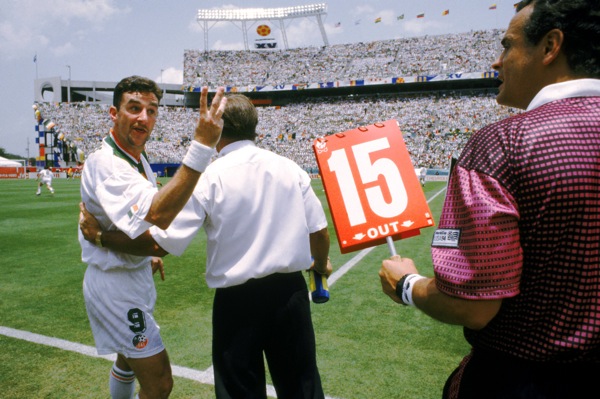Let me try and paint a picture of football in the 1980s. Great emphasis was placed on your first team; so much emphasis that players wore shirts numbered 1-11 and there was just one substitute. Squads didn't exist, if you weren't in the first eleven, you were in the second eleven or the reserves.
Football wasn't strategic, it was tactical. I don't know if that made it better, but it meant that the action happened on the pitch not in the boardroom. It meant that things were more unpredictable, which probably made it more exciting.
Within your first eleven was a big fat goalkeeper, defenders with wonky noses, nippy little wingers and a star striker. Nowadays you have three or four strikers who are rotated; in the 1980s it was just one. The narrative was pure Roy of the Rovers and it had been like that for decades from Tom Finney and Johnny Haynes through Jack Charlton and into the 1980s.
Oxford always had a star striker; Joe Cook, Keith Cassells, Peter Foley, Mick Vinter, Neil Whatmore, Steve Biggins. Each had their moment, Cassells scored against Brighton in the FA Cup, Biggins scored against Manchester United in the League Cup win in 1984. To me, however, it was all building up to the ultimate star striker; John Aldridge.
Aldridge was signed from Newport in 1984 by Jim Smith. History plays tricks on your mind, but it seemed that there was inevitability surrounding his arrival. He started scoring instantly providing additional impetus to the third division title charge, he followed it up a year later with another bucketful to take us through the to the 2nd division title. It was as if a pre-written destiny was being fulfilled.
In the top flight Aldridge set about keeping us up almost single handedly. For all of the legend surrounding Shotton and Briggs, our defence was porous. Aldridge scored 23 league goals, which kept us up.
If the 1980s was the last embers of the football in its traditional image, modern football was being brewed elsewhere. Jack Charlton had become manager of the Republic of Ireland. He set about putting in place a master plan to make his obscure little island into something resembling a force. In short he put winning at the core of everything he wanted to do.
The first thing he did was employ a philosophy of 'route one' football; it was a template that was being adopted in domestic football and was working. Passing, possession and style was effete, balls forward and goals were the new thing; both Watford and Wimbledon had reached stratospheric heights with the philosophy.
Secondly, he used the Irish diaspora to widen his talent pool. Suddenly anyone with a vaguely Irish connection became eligible. Dave Langan - from more traditional Irish stock - was a notable victim, despite, according to his autobiography, introducing both Liverpool born Aldridge and Glaswegian Ray Houghton to the new regime.
In some senses, the new set up was prescient of modern football with teams full of foreign players. It almost didn't matter where you came from, or where spiritually your heart was, so long as you were winning. The Republic of Ireland was almost a franchise.
The impact was immediate, although Aldridge struggled to some extent. Ireland qualified for the European Championships in 1988, beating England and scaring the living daylights out of the Netherlands and the USSR. Aldridge, however, was being used as a target man rather than a goal poacher and goals were hard to find. Charlton would use battering rams such as Niall Quinn and Tony Cascarino (who it eventually turned out wasn't even vaguely Irish).
The experience was intoxicating and Ireland went on to qualify for Italia 90 where they made the quarter-finals, even though they only scored two goals. In each game Aldridge ran around for an hour before being substituted. Against Romania he lasted 20 minutes.
According to all the autobiographies, the Irish experience was a blast for all concerned. By 1994, however, the empire was beginning to crumble as Charlton struggled to replacing his ageing first generation of imports. They qualified for USA '94, becoming almost a replacement England side, who had bowed out in qualifying.
Ireland started well, beating Italy in New York, but facing Mexico in stifling heat (something Charlton obsessed; over earning him a touchline ban) the Irish were found wanting. Aldridge, on the bench, was prepared to join the fray with 20 minutes to go and Mexico 2-0 up. With Norway waiting, the defeat could well have meant curtains for their campaign. Aldridge stood on the sidelines while a particularly fastidious official fussed over administrative technicalities. It took 6 minutes to make the substitution with Charlton and Aldridge screaming at the fourth official to let him on. The tirade, amidst plenty of rum language and finger pointing, was clearly audible on TV. It turned Aldridge into a worldwide legend.
He continued to remonstrate even while trotting onto the field. The fire in his belly helped him score his only World Cup goal, reducing the arrears to 2-1 (Ireland's 4th goal in their World Cup finals history). The goal was essential in reducing their goal difference and allowing them to progress into the second round where they were smited by the Netherlands.
That was the end of Aldridge's World Cup Finals career; more famous for his effin' and jeffin' than for his goals. He played for Ireland for a decade, scoring just 19 goals, although that still makes him the 4th joint top scorer for his country.
Well, I say his country...

No comments:
Post a Comment